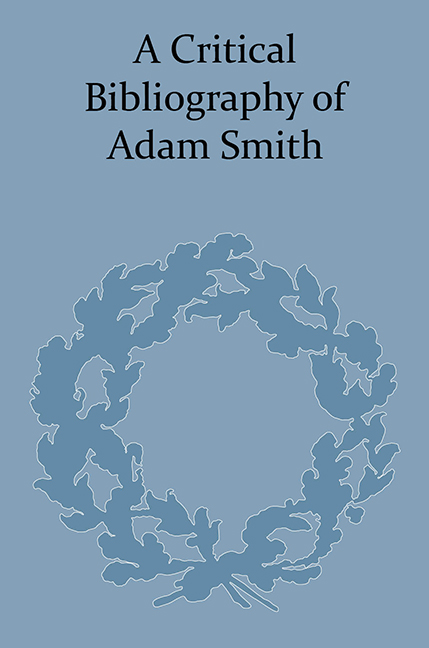Book contents
- Frontmatter
- CONTENTS
- Acknowledgements
- General Introduction
- Early Editions of Adam Smith's Books in Britain and Ireland, 1759–1804
- Adam Smith in English: From Playfair to Cannan
- The Glasgow Edition of the Collected Works of Adam Smith
- The Diffusion of the Work of Adam Smith in the French Language: An Outline History
- The German Reception of Adam Smith
- Adam Smith in Russian Translation
- The Reception of Adam Smith's Works in Poland from the Eighteenth to the Twentieth Centuries
- Adam Smith in the Spanish- and Portuguese-speaking World
- Translations of Adam Smith's Works in Japan
- Adam Smith in China
- Notes to the Bibliographies
- Main Bibliography: All Editions, Chronologically Ordered
- Bibliography by Individual Work
- Bibliography by Language Group
- Note on Dutch Editions
- Note on Italian Editions
- Note on Romanian Editions
- Index
The Glasgow Edition of the Collected Works of Adam Smith
- Frontmatter
- CONTENTS
- Acknowledgements
- General Introduction
- Early Editions of Adam Smith's Books in Britain and Ireland, 1759–1804
- Adam Smith in English: From Playfair to Cannan
- The Glasgow Edition of the Collected Works of Adam Smith
- The Diffusion of the Work of Adam Smith in the French Language: An Outline History
- The German Reception of Adam Smith
- Adam Smith in Russian Translation
- The Reception of Adam Smith's Works in Poland from the Eighteenth to the Twentieth Centuries
- Adam Smith in the Spanish- and Portuguese-speaking World
- Translations of Adam Smith's Works in Japan
- Adam Smith in China
- Notes to the Bibliographies
- Main Bibliography: All Editions, Chronologically Ordered
- Bibliography by Individual Work
- Bibliography by Language Group
- Note on Dutch Editions
- Note on Italian Editions
- Note on Romanian Editions
- Index
Summary
At the University of Glasgow in 1961, a committee of senior members of the academic staff in economics and allied social sciences began thinking of a suitable way to celebrate the bicentenary in 1976 of the first publication of Adam Smith's Wealth of Nations. Their plans did not at first include any project for a new edition of Collected Works. The initial impulse for that came from Professor G. J. Stigler of the University of Chicago in October 1961. Sir Laurence Hunter, now Emeritus Professor of Applied Economics at Glasgow, was at that time a newly graduated student of the Department of Political Economy. He went to Chicago for a year's postgraduate study, and soon after his arrival Professor Stigler asked him whether the University of Glasgow was going to produce a new edition of Adam Smith's works. Stigler thought this would be a highly appropriate way to celebrate the bicentenary of the Wealth of Nations. Hunter communicated this information in a letter to Professor A. L. Macfie, Emeritus Adam Smith Professor of Political Economy at Glasgow. He added that there was a Professor of some seniority at Chicago who might be ready to undertake an edition of the Collected Works. ‘But,’ he went on, ‘I fancy Stigler would not want to intrude on other plans provided the work was done, and he asked me if I knew of anything in that direction.’
Macfie sent a brief interim reply to ensure that Chicago should hold its hand meanwhile. He then drafted a reply for consideration by the committee.
Our Committee has authorised me to write to you as follows:
There is no doubt Glasgow will do something big for 1976. The Court [i.e. the University Court, the governing body of the institution] has been approached, and has indicated its support in principle. We feel sure we shall get it. The scheme we have in mind is something like this. First, we will produce a volume of critical essays on Smith's work and its influence. […]
- Type
- Chapter
- Information
- A Critical Bibliography of Adam Smith , pp. 50 - 60Publisher: Pickering & ChattoFirst published in: 2014



